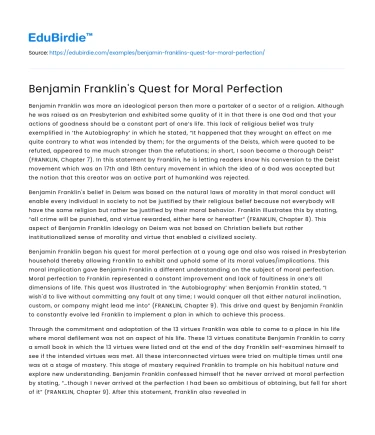Benjamin Franklin was more an ideological person then more a partaker of a sector of a religion. Although he was raised as an Presbyterian and exhibited some quality of it in that there is one God and that your actions of goodness should be a constant part of one’s life. This lack of religious belief was truly exemplified in ‘the Autobiography’ in which he stated, “It happened that they wrought an effect on me quite contrary to what was intended by them; for the arguments of the Deists, which were quoted to be refuted, appeared to me much stronger than the refutations; in short, I soon became a thorough Deist” (FRANKLIN, Chapter 7). In this statement by Franklin, he is letting readers know his conversion to the Deist movement which was an 17th and 18th century movement in which the idea of a God was accepted but the notion that this creator was an active part of humankind was rejected.
Benjamin Franklin's belief in Deism was based on the natural laws of morality in that moral conduct will enable every individual in society to not be justified by their religious belief because not everybody will have the same religion but rather be justified by their moral behavior. Franklin illustrates this by stating, “all crime will be punished, and virtue rewarded, either here or hereafter” (FRANKLIN, Chapter 8). This aspect of Benjamin Franklin Ideology on Deism was not based on Christian beliefs but rather institutionalized sense of morality and virtue that enabled a civilized society.
Save your time!
We can take care of your essay
- Proper editing and formatting
- Free revision, title page, and bibliography
- Flexible prices and money-back guarantee
Benjamin Franklin began his quest for moral perfection at a young age and also was raised in Presbyterian household thereby allowing Franklin to exhibit and uphold some of its moral values/implications. This moral implication gave Benjamin Franklin a different understanding on the subject of moral perfection. Moral perfection to Franklin represented a constant improvement and lack of faultiness in one’s all dimensions of life. This quest was illustrated in ‘the Autobiography’ when Benjamin Franklin stated, “I wish'd to live without committing any fault at any time; I would conquer all that either natural inclination, custom, or company might lead me into” (FRANKLIN, Chapter 9). This drive and quest by Benjamin Franklin to constantly evolve led Franklin to implement a plan in which to achieve this process.
Through the commitment and adaptation of the 13 virtues Franklin was able to come to a place in his life where moral defilement was not an aspect of his life. These 13 virtues constitute Benjamin Franklin to carry a small book in which the 13 virtues were listed and at the end of the day Franklin self-examines himself to see if the intended virtues was met. All these interconnected virtues were tried on multiple times until one was at a stage of mastery. This stage of mastery required Franklin to trample on his habitual nature and explore new understanding. Benjamin Franklin confessed himself that he never arrived at moral perfection by stating, “…though I never arrived at the perfection I had been so ambitious of obtaining, but fell far short of it” (FRANKLIN, Chapter 9). After this statement, Franklin also revealed in the following sentence that this self improvement project that he embarked on made him a better and happier man.
The virtue that Benjamin Franklin found most challenging was the third virtue regarding order. Franklin goes on supporting this notion by stating, “My scheme of Order gave me the most trouble” (FRANKLIN, Chapter 9). Benjamin Franklin revealed in his autobiography that this virtue of Order was the most difficult to achieve as he continually relapsed and failed at every turn. In the process of exemplifying this notion in ‘the Autobiography’, Benjamin Franklin gave the readers a depiction of the “man who, in buying an ax of a smith”. In this depiction Franklin employed his saying “a speckled ax is best?” to reveal that a man can not be a hundred percent surface “bright as the edge”, meaning that a person can find more happiness by not always attempting to be 100 percent at all times but by incorporating some aspect of imperfection. In this case Benjamin Franklin illustrated himself as the ax who is looking to sharpen his whole surface with moral perfection but eventually finding that some speckled imperfection is the best quality.






 Stuck on your essay?
Stuck on your essay?

